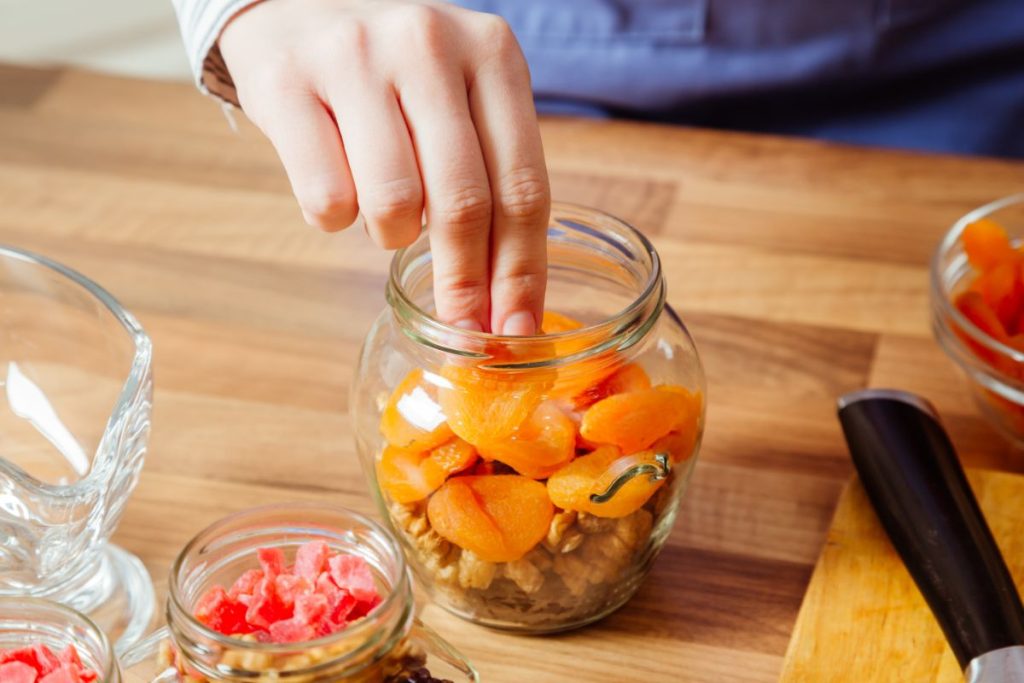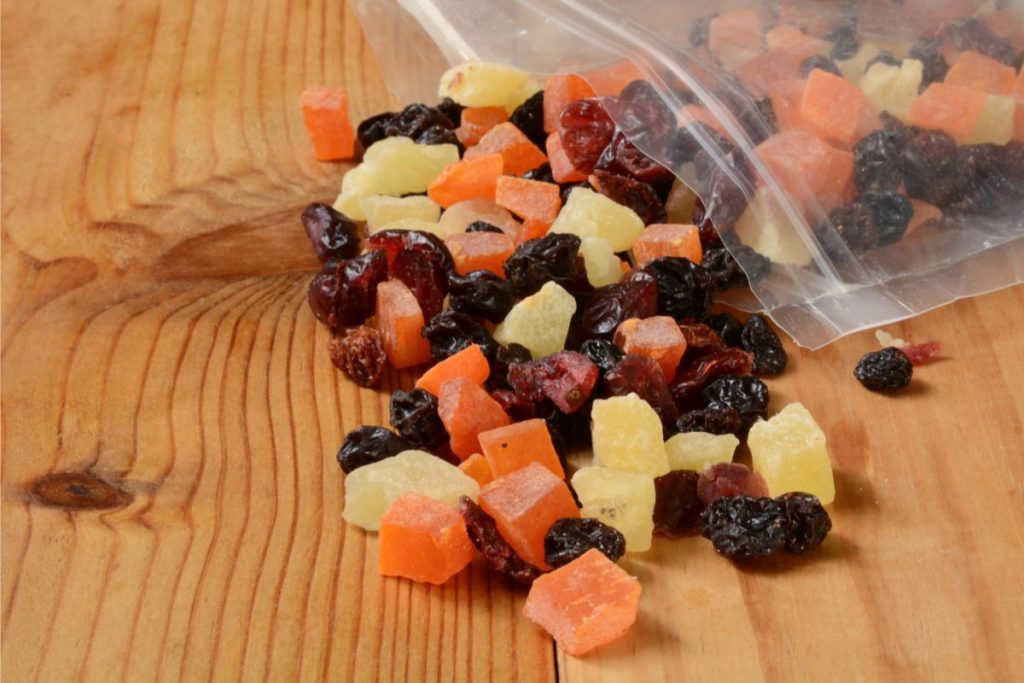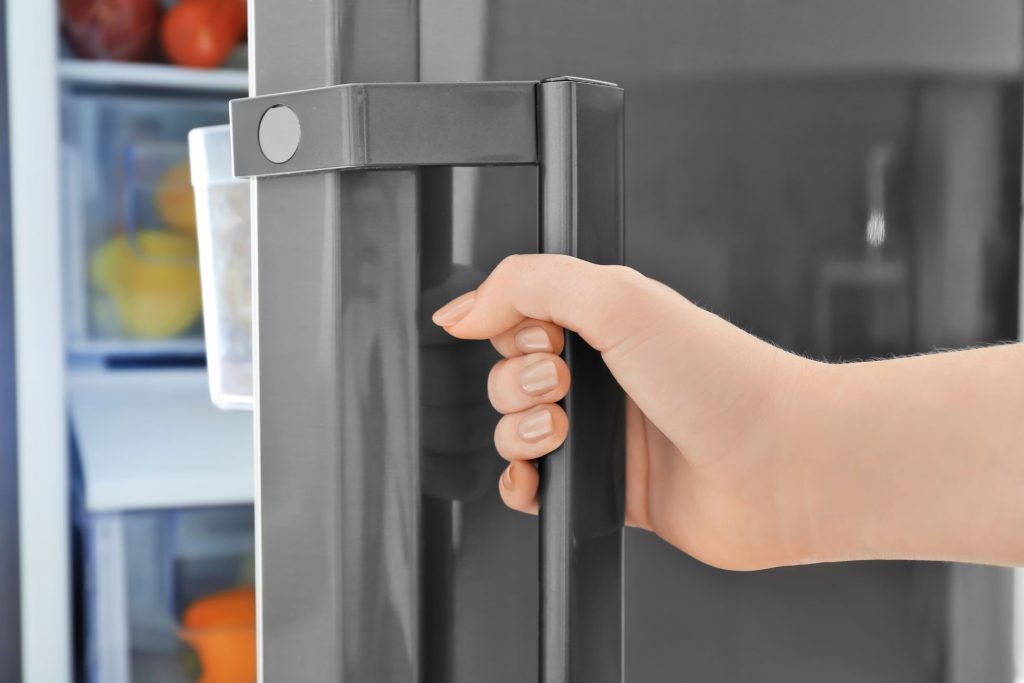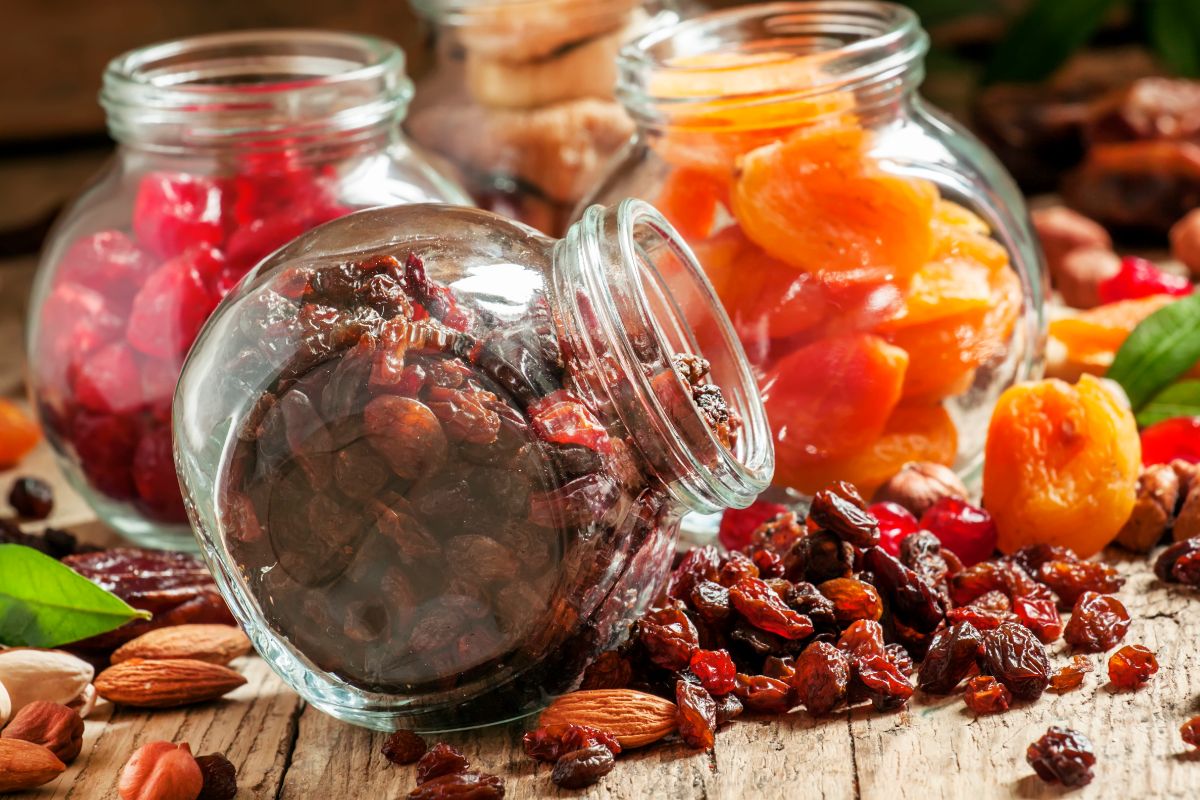The best containers for storing dried fruit are airtight food-grade containers such as glass jars, Mason jars, Mylar bags, and vacuum-seal bags. Store containers of dried fruit in a cool, dry, dark place at room temperature or in cold storage.
Table of Contents
What is the Best Way to Store Dehydrated Fruit?
The best way to store dehydrated fruit is to keep it in an airtight container in a cool, dry, dark place.
Follow these tips to maximize the storage and shelf life of dried fruit:
- After dehydrating fresh fruits, allow them to cool to room temperature before testing them for dryness.
- Re-dehydrate any fruits that show signs of excess moisture. Dried fruit should be either brittle and snap when bent or be leathery and pliable with no excess moisture when squeezed.
- Condition dried fruit in airtight containers before you store them. Fruit should be kept in a clear container and shaken daily for 3-7 days. If no condensation forms inside the jar, proceed with long-term storage.
- Airtight storage containers should only carry enough fruit for a single use. Repeatedly opening a container exposes the dried fruit to air and moisture, accelerating spoilage.
- Storage containers should be clean, dry, and free of odors from previously stored dried foods.
- If you live in a high-humidity area, add a desiccant packet inside the container at the top or use an oxygen absorber if the food has less than 10% moisture content.
- A vacuum sealer removes as much air as possible from storage containers and canning jars before sealing.
- Label each storage container with the drying date and the type of fruit to keep track of shelf life.

Should Dried Fruit Be Stored in Airtight Containers?
All dried fruit should be stored in airtight containers. Containers with an airtight seal completely keep oxygen, moisture, and pests out and drastically increase the shelf life of dried fruit.
What are the Best Storage Containers for Dried Fruit?
1. Glass Jars, Mason Jars, and Canning Jars
Store dried foods in clear containers that allow you to monitor the condition of the food. Canning jars such as Mason jars are suitable for storing dried fruit that you plan on using regularly.
2. Mylar Bags
Mylar bags are excellent for storing dried fruit in cold conditions, especially when stored with an oxygen absorber inside. With Mylar bags, you can use the double bag freezer storage technique, where you place the bag with the dried food inside another airtight bag to prevent freezer burn.
3. Vacuum-seal Bags
Vacuum packaging is an effective method for storing dried fruit by creating a low-oxygen environment, preventing oxidation. While you can vacuum-seal most storage containers, vacuum-seal bags are the best option as they are easier to remove air from with most vacuum sealers.
4. Freezer Bags and Containers
Freezer-safe containers and bags are better than plastic bags since they are thicker and reduce light and odor penetration. Plastic bags are not ideal for long-term storage containers, but properly sealed freezer bags are.

What Should You Do to Keep Dried Fruit Fresh?
You can keep dried fruit fresh by adding an oxygen absorber or silica desiccant packet inside the container. Avoid keeping the two in the same container since the desiccant will limit oxygen removal.
Oxygen absorbers maintain the freshness of stored dried food by removing up to 99.99% of the oxygen. Desiccants absorb moisture in the food storage container, which can cause molding and loss of quality.
Should Dried Fruit Be Stored in the Refrigerator?
A refrigerator is a good storage location for a short period of time, but a freezer is better for long-term storage. Refrigerators minimize oxidation and are ideal for storing unopened containers of dried fruits such as cranberries, prunes, and apricots.

What are Some Precautions to Take When Storing Dried Fruit?
- Aim for a storage temperature between 50°F – 70°F
- Always store dried foods at a relative humidity level of 50% – 70%
- Always keep dried foods at least six inches off the floor to avoid fluctuating temperatures
- Discard frozen dried fruits that exhibit signs of freezer burn
- Discard dried fruits that have off odors or signs of mold, as eating these may lead to botulism
- Do not store dried fruits in the freezer toward the end of their storage life
How Long Can You Store Dried Fruit?
Depending on the type of fruit, dried fruit can be stored for 6 months to 15 years when stored away from direct sunlight, heat, and moisture. Freeze-dried food kept in vacuum-seal bags with an oxygen absorber can remain viable for up to 30 years.

